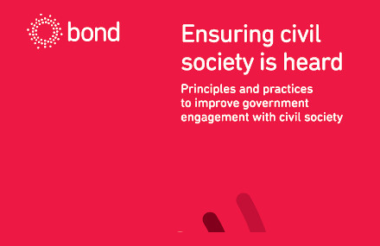The relationship between the government and international development charities has worsened, according to a report from Bond.
In a report published yesterday, Ensuring Civil Society is Heard, Bond said that there has been a "rapid decline in engagement" from government leaving the sector excluded from decision-making processes and exposing government policies and programmes to avoidable errors.
It has called on the government to strengthen its relationship with civil society, and said that a strengthened dynamic, which they believe means one which is “meaningful, inclusive and deliberative” would make government more effective, accountable and transparent. It said that greater engagement would help bring new perspectives to the sector and add another layer of checks and balances.
The report comes after DfID published the Civil Society Partnership Review in 2016 to establish working practices with the sector. Bond claim that promises to increase dialogue and engagement have fallen short.
“There have been some positive examples [of engagement] however, this is outweighed by a strong feeling among large parts of civil society that engagement with DfID and other government departments has not improved as much as hoped,” it said.
Brexit
It said that Brexit had caused uncertainty and that many charities were exploring moving to EU countries post-Brexit in part because they say the government had not sourced the charity sector’s opinions on Brexit policies and that “information has been drop fed,” to the sector.
It added that Brexit was causing civil servants to be moved to different departments, creating a lack of resource for charities. “The government’s response to the fall-out of Brexit could further undermine DfID’s already inadequate capacity to engage with civil society,” it said.
Claire Godfrey, head of policy and campaigns at Bond, said: “Any political oxygen around global and domestic challenges is being consumed by Brexit, which is making the rapid decline in civil society engagement around government policy even more detrimental. Now is not the time to be shutting civil society out. Now is the time for meaningful, inclusive and deliberative engagement. Civil society ensures a healthy democracy, better policy-making, and bolsters public debate, helping to ensure that all voices are heard.”
The report also criticised the government for treating civil society groups like suppliers not stakeholders, after DfID launched a Strategic Relationship Management Scheme in January 2018 in which it began using civil society groups in its procurement processes. The report said this was “a major shift in DfID’s relationship with civil society” claiming that it made it “transactional”.
It also recommended that charities are able to communicate more with other government departments, not just DCMS and DfID and that charities should be involved in government plans as early as possible.
Government response
A spokesperson from DfID said that the department values its relationship with civil society organisations and that they had met with 80 of these groups in the last 18 months to improve engagement.
“DfID has a proud track record of working with civil society organisations in every aspect of its work. From driving up safeguarding standards across the aid sector to the UK’s world-leading humanitarian response during crises like Cyclone Idai, working with these vital organisations is at the very heart of our decision-making," they said.
They added that they have regularly met with civil society groups to reassure them about Brexit and to respond to their queries about it.
Related articles












